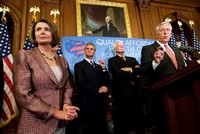Health Care Bill to Stand Key Vote
The health care vote is seen as the final hurdle before the full House and Senate can begin their debate on the future of health care.

In a speech on the Senate floor, Reid, D-Nev., blasted Republicans for opposing the Finance Committee's measure, accusing GOP leaders of aiming to be "partisan protesters" rather than "productive partners."
In the meantime, one day after Democrats celebrated the news that a bill drafted in the Senate Finance Committee would not increase the deficit, the prospects for speedy enactment of landmark reform grew murkier. Industry leaders, who have held their tongues for months, spoke in increasingly dire tones Thursday about the impact of the Democratic proposals, raising the specter of an eleventh-hour lobbying campaign to defeat Obama's centerpiece domestic policy goal.
Many lobbyists and independent analysts underlined what they called major flaws in the Finance Committee's bill, saying it probably would draw the sickest, most expensive patients into the health coverage system without balancing the insurance risk with more young, healthy people. The result, they predicted, would be ever-rising premiums for the people, businesses and governments that pay for medical care.
It was also reported, Democrats had worried that changes made by the committee, in seven days of deliberations, would add to the cost or reduce the number of people covered. The projected 10-year cost of the bill did increase, from $774 billion in Mr. Baucus’s original proposal. But the new costs were more than offset, and the budget office found that the latest version would reduce deficits by $32 billion more than the original plan.
The bill would require people to have insurance but reduced the penalties for those who violate the requirement. Senators of both parties had expected this change to reduce the number of people gaining insurance under the bill. But the budget office did not alter its estimate.
In a sign of the furious debate that lies ahead, hospital lobbyists said Wednesday that the coverage was not good enough to meet the terms of an agreement they had reached with Mr. Baucus and the White House. The industry said it had agreed to accept $155 billion in reduced Medicare payments over 10 years, provided that 97 percent of all legal residents were insured.
Subscribe to Pravda.Ru Telegram channel, Facebook, RSS!





